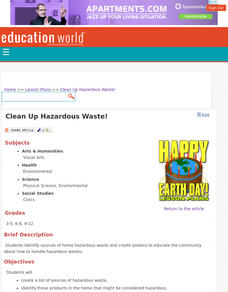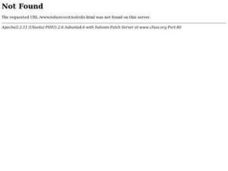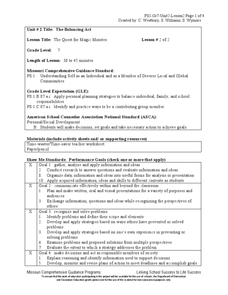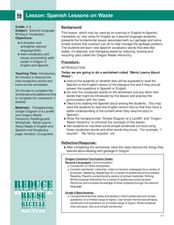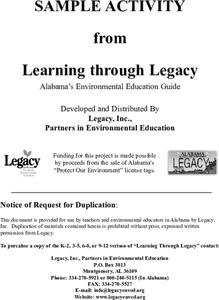Baylor College
Fuel for Living Things
During a three-part lesson, learners make a cabbage juice pH indicator and use it to analyze the waste products of yeast after feeding them with sugar. The intent is to demonstrate how living organisms produce carbon dioxide, which is...
Curated OER
Watershed Works: Unit 3
Geology whizzes observe the effects of change within a model of a watershed. They place replica waste dumps within the models and note the path that the waste takes as water passes through. This detailed lesson plan provides teacher...
Curated OER
Where Is Away?
Students explore garbage. In this landfill lesson, students investigate how much garbage is collected in landfills on average each day. Students discover hazardous materials that are disposed of improperly and the effects of these...
Curated OER
Pollution
Young ecologists investigate some of the many ways that human activities adversely affect the environment. After identifying the main types of pollution (air, water, soil), 3rd graders fill in a Venn Diagram by pasting cut-out pictures...
Curated OER
Clean Up Hazardous Waste!
Students identify sources of home hazardous waste and create posters to educate the community about how to handle hazardous wastes.
Curated OER
Trash Talkin
Learners investigate recycling at several scales, including local, state, national and global. They become aware of recycling, re-use, reduce efforts and policies. Students read the article Where Does Your Garbage Go. They look up where...
Curated OER
Solid Waste and Recycling
Students demonstrate effects of waste on environment and ways of reducing it, observe how much packaging goes into bag lunches each day, and survey their families to assess awareness levels and household recycling practices. Lessons all...
Curated OER
Green Chemistry
The principles of pollution control on a molecular level are summarised here. The reasoning and study behind the principles are described, and your class will undestand how some techniques are developed to be more efficient.
Curated OER
Our Natural Resources
Soil, water, fish, wildlife and forest are the main resources that are reviewed in this PowerPoint. Overuse and waste versus the value of the resources used and the long-term impact is covered in this clear presentation. It would be good...
Curated OER
Garbage in the Garden
Students create their own compost. In this soil lesson, students fill a bag with waste and soil, in order to create a mini compost bin. Students observe the baggies over a 6 week period, they record their findings and collect data...
Curated OER
The Quest for Magic Minutes
Seventh graders explore ways to manage their time. As a class, they brainstorm time-wasters that keep them from their responsibilities. In teams, they design one time-saver for each time-waster. Afterward, they design a commercial based...
Curated OER
Applied Science - Built Environment Lab
Students evaluate trash. In this Science lesson, students collect and weigh trash from their classrooms. Students categorize the trash and the corresponding weights, recording the information on a data sheet.
Curated OER
Polystyrene Containers
Students conduct experiments to determine the effectiveness of polystyrene containers at preventing heat loss. In this polymers lesson, students design an experiment to determine how effective Styrofoam burger containers are at...
Curated OER
The Total Package
Students design streamlined packaging designed to reduce waste production. In this waste reduction instructional activity, students view a diagram to introduce the concept of the engineering design process and discuss ways that packaging...
Curated OER
Collective Compromise
Students explore the concept of philanthropy. In this service learning lesson plan, students examine what to do with waste as they plan and implement a strategy for controlling their school's trash.
Curated OER
Water Conservation
Students identify ways to conserve water. In this environmental lesson plan, students use a water use checklist to identify how much water they use in one day. Students analyze the data and brainstorm ways to conserve water.
Curated OER
Spanish Lessons on Waste
Students investigate waste. In this environmental lesson, students read a worksheet in both Spanish and English and share how they recycle at home. Students are encouraged to use key vocabulary words from the worksheet such as "recycle"...
Curated OER
What Will Biodegrade?
Young scholars create their own landfill where they observe materials that will and won't biodegrade. In this biodegrading lesson, students discuss the concept of a landfill and what materials biodegrade into soil and which ones stay in...
Curated OER
I'm Warm Now
Third graders graph how much water is wasted while waiting for it to get warm in the spigot in the sink. In this graphing lesson plan, student first predict how much water is wasted. That night they test it out at home and the next day...
Curated OER
Pollution and Marine Life
In this pollution and marine life worksheet, students use 9 given terms related to types of pollution and ocean food chains to complete sentences. Students number the effects of human sewage and soil runoff that harm ocean organisms in...
Curated OER
How Long Until Dirt
Third graders examine the difference between composting and wasting food. They problem-solve what to do about leftovers after lunches so good food doesn't go to waste.They study food storage techniques that are environmentally friendly...
Curated OER
Garbage Pizza
Learners examine amount of garbage disposed of by average household weekly, classify different categories of garbage and describe composition of landfills, investigate what happens to waste after it is collected by garbage trucks, and...
Curated OER
Classifying Waste: What Kind is Mine?
Students discover what happens to their trash and garbage once it is collected off of the curb. In groups, they classify garbage and waste into seven different categories and estimate how much waste is created in each one. Using the...
Curated OER
What Is The Concept?
Students systemically determine the concept that the waste items placed in a "yes" category are biodegradable and those in the "no" category are not. This activity is a motivating way to introduce a unit on wastes by having students use...






